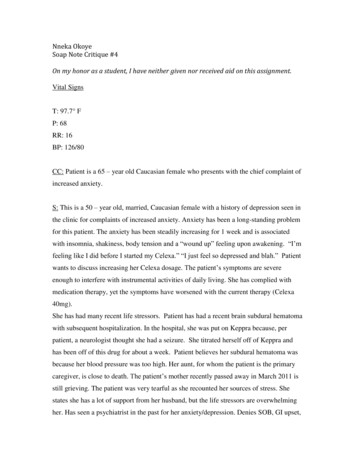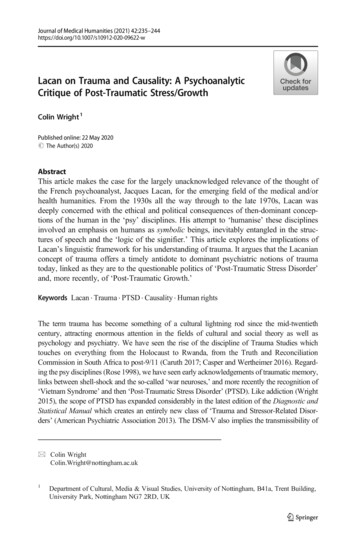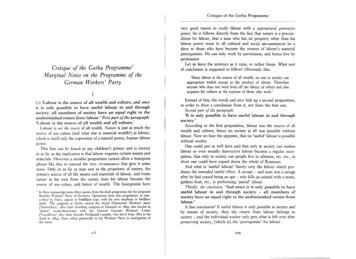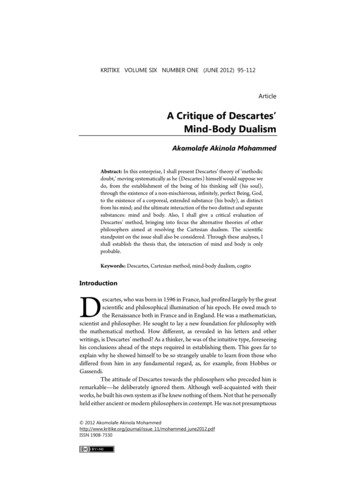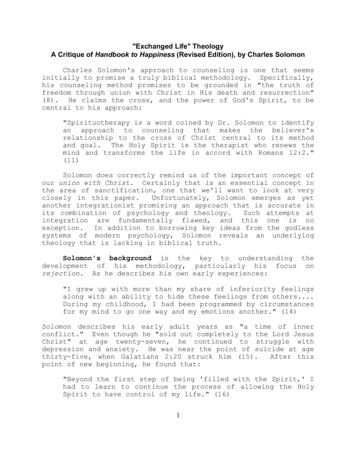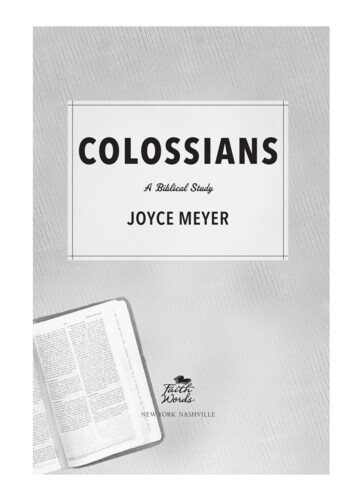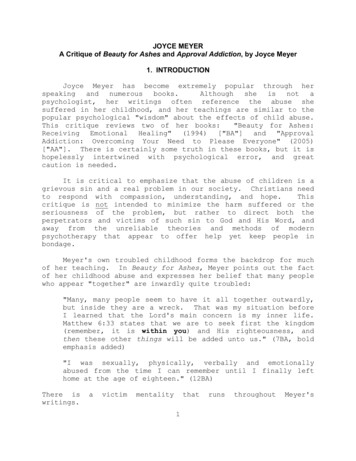
Transcription
JOYCE MEYERA Critique of Beauty for Ashes and Approval Addiction, by Joyce Meyer1. INTRODUCTIONJoyce Meyer has become extremely popular through ologist, her writings often reference the abuse shesuffered in her childhood, and her teachings are similar to thepopular psychological "wisdom" about the effects of child abuse.This critique reviews two of her books:"Beauty for Ashes:Receiving Emotional Healing" (1994) ["BA"] and "ApprovalAddiction: Overcoming Your Need to Please Everyone" (2005)["AA"]. There is certainly some truth in these books, but it ishopelessly intertwined with psychological error, and greatcaution is needed.It is critical to emphasize that the abuse of children is agrievous sin and a real problem in our society. Christians needto respond with compassion, understanding, and hope.Thiscritique is not intended to minimize the harm suffered or theseriousness of the problem, but rather to direct both theperpetrators and victims of such sin to God and His Word, andaway from the unreliable theories and methods of modernpsychotherapy that appear to offer help yet keep people inbondage.Meyer's own troubled childhood forms the backdrop for muchof her teaching. In Beauty for Ashes, Meyer points out the factof her childhood abuse and expresses her belief that many peoplewho appear "together" are inwardly quite troubled:"Many, many people seem to have it all together outwardly,but inside they are a wreck. That was my situation beforeI learned that the Lord's main concern is my inner life.Matthew 6:33 states that we are to seek first the kingdom(remember, it is within you) and His righteousness, andthen these other things will be added unto us." (7BA, boldemphasis added)"I was sexually, physically, verbally and emotionallyabused from the time I can remember until I finally lefthome at the age of eighteen." (12BA)There r's
It is extremely troubling to observe Meyer's view of herown authority to teach.She appears to affirm biblicalteachings about submission to authorities established by God:"The Bible teaches us to submit to authority.If wewill not submit to man's authority, we will not submit toGod's authority either." (212AA)However, she refuses to even receive advice from her own husbandon the content of her teaching:"I receive advice from Dave [Meyer's husband] in every area[of her ministry] except what I am teaching in ourconferences and on television. I know I must receive thatinformation from God's Spirit--and not Dave or others--ifit is to be anointed.I am a mouthpiece of God, and assuch I must be led by Him in what I teach." (211AA)This attitude is quite dangerous, in that Meyer places herselfbeyond the reach of discernment, criticism, or authority.Inlight of man's sinful nature, no human being is a "mouthpiece ofGod" so completely beyond the realm of biblical authority,instruction, or correction.2. REVELATION/SCRIPTUREMeyer holds a distorted view of revelation and the mannerin which God speaks to us, placing her own interpretations aboveothers and often reading her psychological views into Scripture.As noted in the introduction, she claims direct revelation fromGod beyond His revealed Word:"It is also important to realize that God has differentcalls on our lives.Since He has called me to teach HisWord, it was better for me to receive the truth I neededdirectly from Him.However, that is not a rule foreveryone." (44-45BA)At the beginning of one chapter, Meyer describes an incidentwhere she prayed with a woman who had described a particularbondage in her life. Meyer had a "vision" of the woman standingon a track, and a "message" she believes came from God (59BA),but there is no indication that she counseled this woman fromScripture. Meyer places her own supposed "revelation" from Godon the same level as Scripture. This is a dangerous practice.2
In teaching others about receiving God's guidance, Meyeracknowledges the power of Scripture yet relies more on feelingsthan on the study of God's Word and the instruction of ordainedchurch leaders:"God's Word has inherent power in it. When we release ourfaith in His Word, that power is released into our livesand situations to help us." (117AA)"Sometimes we don't feel peaceful about a certain thing,and we don't have any idea why. The Scriptures teach us tofollow after peace; it is one of the ways God leads us."(182AA)She of"We must not automatically reject what others think, but wemust not let it control us either.You are anindividual, with individual rights. Don't let anyone stealfrom you what Jesus died to give you--which is the freedomto follow the leading of the Holy Spirit for you as anindividual." (165AA)Notice, here, that Meyer's claim about "what Jesus died to giveyou" is contrary to the gospel.He died to free us from thepenalty and power of sin.Biblically, believers are to testwhat they hear, like the Bereans, to see whether it conforms toScripture.This critique, for example, is intended to helpMeyer's readers to carefully discern between truth and error inher teachings. Her view of revelation is tainted with feelingoriented language and claims to divine revelation beyondScripture, rather than the study of what God actually says inHis Word.Meyer repeatedly engages in eisegesis, readingEisegesis.her own psychologized worldview into Scripture, rather thanengaging in exegesis to draw out of the passage the message thatGod intended. Following are three examples of this practice.1.In John 3:22ff, certain disciples brought a report toJohn the Baptist about the fact that Jesus was baptizing people.Meyer assumes, without support from Scripture, that thesemessengers were insecure and/or attempting to stir up jealousy:3
"This message was carried to John inintended to make him jealous.Thethe report were obviously insecuredevil in an attempt to stir up sometoward Jesus." (132BA)a wrong spirit; it wasdisciples who broughtand being used by thewrong feelings in JohnScripture is silent as to the motives of the messengers. It ispossible they were jealous, but not "obvious" as Meyer clarification.Much of Meyer's teaching is focused aroundinsecurity and its alleged effects, and she imposes this ontoScripture rather than seeking to understand what God intends tosay.This particular passage emphasizes the deity of JesusChrist, as John the Baptist points out in his response (see John3:27-36).2.Meyer also reads her views about insecurity onto thewell-known text (Matthew 7:24-27) where Jesus instructs us tobuild our lives on His Word, the "rock":"The Bible encourages people to build their lives on solidrock, not sand.If we try to build our lives on whatpeople say and think of us--how they treat us, how we feel,or our past mistakes--we are building on sinking sand.Before I experienced the healing power of Jesus Christ, mylife was like a house built on shifting sand rather thansolid rock. My foundation was weak. I was not secure, Idid not like myself, and I was filled with guilt and shamefrom abuse." (187AA, emphasis added)This passage is about building our lives on the solid rock ofGod's Word.Of course, it is wrong to substitute the opinionsof other people for the Word of God, but Meyer reads a greatdeal more into the text, presupposing her own psychologicalviews about self-hate and insecurity.3.Meyers believes that Jesus practiced "tough love,"because "whenever possible He helped them help themselves.Heinstructed them to take some particular action" (for example,the crippled man in Matthew 9:6, raising little girl in Mark5:35-36, blind man in John 9:1-7):"Instead of merely feeling sorry for these people, Jesusmoved them to action.He helped them get their minds offthemselves and their problems, and He motivated them to dosomething about them." (210AA)4
The well-worn phrase, "God helps those who help themselves," isnot a biblical concept.On the contrary, Christ died for us"while we were yet sinners" (Romans 5:8), spiritually dead insin (Ephesians 2:1) and unable to resurrect ourselves.We dohave biblical responsibilities to take action, and God hasprepared good works for us to do as His redeemed people(Ephesians 2:10), but the accounts of Jesus' miracles have acompletely different purpose.Matthew 9:6 explains the purpose of Jesus' command to theparalytic to take up his bed and walk. It was so the audiencewould know that Jesus Christ had the authority on earth toforgive sins. Only God has such authority. Jesus knew the evilthoughts of the scribes, who accused Him of blasphemy, and Heresponded with the command to the paralytic.Nothing in thetext indicates that the paralytic was being encouraged to "helphimself."Jesus command to the 12-year-old girl in Mark 5:35-43, to"arise" and walk, proved that she was not dead, as those fromthe synagogue official's house had announced (5:35).As inMatthew's account of the paralytic, the deity of Christ is atthe forefront of the text.Christ demonstrates His power toraise the dead.The healing of the blind man in John 9:1-7 is similar.Jesus explains that the man's blindness is not the direct resultof his own or his parents' sin, but rather that the glory of Godmight be displayed.Jesus healed in many different ways, andthis text says nothing as to why He used this particular method,applying clay to the man's eyes and instructing him to wash inthe pool of Siloam. Like the miracles in Matthew 9 and Mark 5,this one highlights the deity of Jesus Christ, the Son of Godwho has the power to heal the sick and raise the dead.3. DOCTRINE OF GODMeyer holds a deficient view of God and His sovereignty.Her view subjects God to the will of man:"No matter how many wonderful plans God has in mind foryou, there is one thing you must know:God's ability tobring His will to pass in your life is determined by yourfaith in Him and His Word. If you truly want to be happyand successful, then you must begin to believe that God has5
a plan for your life and that He will cause good things tohappen to you as you put your trust in Him." (92BA,emphasis in original)"The Holy Spirit is grieved because He is sent to bringGod's plan to pass in your life, and He never is able to doit without your cooperation." (95BA)"Careful study of this verse [Isaiah 30:18] reveals God asOne Who is literally waiting for an opportunity to be goodto us, to bring justice into our situations.However, Hecan do that only for those who are expecting and waitingfor Him to do so.Give up the labor of 'self-protection'and start allowing and expecting God to protect you."(160BA)"It is not God's will for us to be controlled by anybodyexcept His Holy Spirit, and even that decision He leaves upto us.God won't even force His will on us, so wecertainly should not let anyone else do it." (207AA)God's ability is not limited in this manner.Of course it isimportant to trust in Him, but nevertheless, He works all thingsaccording to the counsel of His own will (Ephesians 1:11). Hisability to do so is not limited by man.Moreover, even ourfaith is a gracious gift of God (Ephesians 2:7-9).Some of Meyer's comments are a mixture of truth and error:"Even though the Lord has promised never to leave us norforsake us (Heb. 13:5), when we get ahead of God and beginto 'do our own thing,' we are in dangerous territory. Ourheavenly Father is under no obligation to sustain us inbearing trials that were never a part of His plan for us."(49BA)Yes, it is indeed dangerous to attempt to "get ahead of God" and"do our own thing." Yet while God is not obligated to sustainus in the resulting trials, just as He was not obligated to sendChrist to die for our sins, He is gracious and compassionate andoften does sustain us through the trials caused by our sins.The entire Old Testament is a witness to His incredible mercyand compassion, as He dealt with His rebellious people.Moreover, such trials are not outside of His plan for our lives;see, for example, Hebrews 12:5-6.6
Perhaps one of the worst problems with Meyer's theology isa statement that borders on pantheism:"Diamonds have many facets.God is like a flawlessdiamond, and each of us represents a different facet ofHim. He has placed a part of Himself in each of us, and wecorporately make up His Body." (96BA)Yes, believers corporately are Christ's church, often referredto figuratively as His body.His Spirit lives in those whobelong to Him. However, God has not placed "a part of Himself"in each believer.Meyer's statement is confusing at best, andit comes close to attributing deity to human beings rather thanpreserving the Creator-creature distinction found in Scripture.Meyer's limited view of God's power and compassion is onethat hinders the believer's growth rather than encouraging it.4. MEDICAL MODELMeyer's view of how people change is grounded in theerroneous psychological "medical model" that confuses thedistinctions between sickness and sin, and between healing andsanctification. Like the popular 12-step groups, the "recovery"movement, and psychologists in general, she views change ification:"Our emotions are part of our makeup, and they can wear outor become sick like any other part of the anatomy.Ifyou have an emotional wound in your life, Jesus wants toheal you." (105AA)Meyer's assessment of her own situation reveals the subtleshift in responsibility that results from squeezing sin into amedical model:"My problems were not in my home life or my marriage, butin me, in my wounded, crippled emotions." (21BA)"It never occurred to me that I was suffering from theyears of abuse and rejection that I had gone through.Ithought that all that was behind me. It was true that itwas no longer happening to my physically, but it was allrecorded in my emotions and in my mind. I still felt the7
effects of it, and I stillemotional heali
Joyce Meyer has become extremely popular through her speaking and numerous books. Although she is not a psychologist, her writings often reference the abuse she suffered in her childhood, and her teachings are similar to the popular psychological "wisdom" about the effects of child abuse. This critique reviews two of her books: "Beauty for Ashes: Receiving Emotional Healing" (1994) ["BA"] and .


